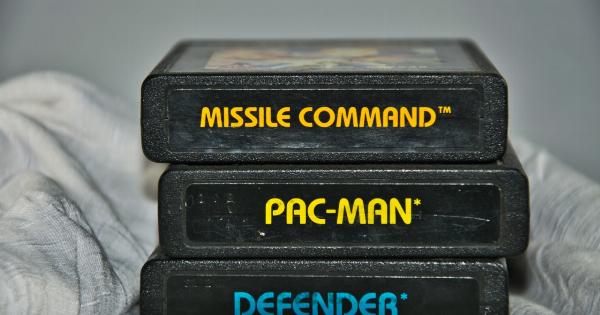Looking for a mental workout to challenge your brain? Look no further than crossword puzzles and Sudoku! These two popular types of puzzles not only provide hours of entertainment but also offer a range of cognitive benefits.
Whether you enjoy word games or number puzzles, both crosswords and Sudoku can test your problem-solving skills, enhance your memory, and improve your overall mental agility. In this article, we will delve into the world of brain busters and explore the fascinating aspects of crossword and Sudoku challenges.
The Art of Crossword Puzzles
Crosswords are an excellent way to sharpen your word knowledge and vocabulary. These puzzles consist of a grid with blank squares that are interconnected both across (horizontally) and down (vertically).
Your goal is to fill in the blank squares with letters to create words or phrases that match the given clues. The clues can be straightforward definitions, clever wordplay, or even puns.
One of the greatest benefits of doing crosswords is expanding your vocabulary. As you encounter new words and phrases while solving puzzles, you naturally learn their meanings and increase your lexicon.
Crosswords also require you to think creatively and make connections between different words and ideas. By doing so, they improve your cognitive flexibility and lateral thinking skills.
Solving crosswords also exercises your memory and reasoning abilities. You need to recall information from your long-term memory, connect it with the given clues, and generate potential answers based on your knowledge.
This mental process boosts your memory retention and retrieval skills. Additionally, crosswords demand analytical thinking and problem-solving techniques, as you must carefully evaluate the clues and consider various possibilities before arriving at the correct solution.
The Logic of Sudoku
If numbers are more your thing, then Sudoku may be right up your alley. Invented in the late 1970s but gaining worldwide popularity in the early 2000s, Sudoku is a logic-based number puzzle.
The puzzle consists of a 9×9 grid, divided into nine 3×3 subgrids. The goal is to fill in the empty squares with numbers from 1 to 9, making sure that each row, column, and subgrid contains all the numbers once.
Sudoku provides a unique mental challenge that engages different areas of your brain. It requires logical thinking, pattern recognition, and the ability to eliminate possibilities.
Similar to crosswords, solving Sudoku puzzles enhances your problem-solving and critical thinking skills. The more puzzles you tackle, the better you become at recognizing number patterns and identifying the next logical step to complete the grid.
Playing Sudoku also boosts concentration and focus. To successfully complete a Sudoku puzzle, you need to pay close attention to the numbers already in the grid and carefully analyze the potential positions for the remaining numbers.
This level of focused attention translates into improved concentration skills in other areas of life as well.
The Benefits of Brain Busters
Both crosswords and Sudoku offer several benefits beyond just being enjoyable pastimes. These brain busters exercise your brain in multiple ways and help keep your mind sharp. Here are some of the key advantages:.
1. Mental Stimulation
Engaging in crossword and Sudoku challenges provides mental stimulation that is crucial for maintaining brain health. Just like physical exercise keeps your body fit, mental exercise keeps your brain in top form.
By regularly challenging yourself with puzzles, you can reduce the risk of cognitive decline and conditions such as dementia.
2. Memory Enhancement
Solving crosswords and Sudoku puzzles stimulates the hippocampus, the part of the brain associated with memory formation and retrieval. By exercising this region, you strengthen your memory and improve your ability to recall information.
This is particularly beneficial for older individuals who may be experiencing age-related memory decline.
3. Problem-Solving Skills
Both crosswords and Sudoku require you to think critically and solve problems by analyzing the given information.
As you tackle more puzzles, you develop efficient problem-solving strategies, learn to think outside the box, and enhance your ability to approach challenges with a logical mindset. These skills can be applied to various real-life situations.
4. Stress Reduction
Puzzles are known for their ability to provide a sense of relaxation and reduce stress. Engaging in the solving process diverts your attention away from daily worries and helps you experience a state of flow.
This state of focused immersion promotes a feeling of calmness and can contribute to improved overall well-being.
5. Entertainment and Fun
Perhaps the most obvious benefit of crossword and Sudoku puzzles is the entertainment factor. Whether you solve them alone or compete with friends and family, these brain busters offer a fun and engaging way to spend your leisure time.
They provide a healthy alternative to other forms of entertainment that may not engage your brain as much.
Conclusion
Whether you prefer words or numbers, crossword puzzles and Sudoku challenges can provide an entertaining and rewarding mental workout. These brain busters enhance your vocabulary, improve your memory, and boost your problem-solving skills.
Engaging in these mentally stimulating activities not only keeps your brain sharp but also provides a sense of relaxation and overall well-being. So, the next time you find yourself seeking a challenge, pick up a crossword or Sudoku puzzle and enjoy the countless benefits they have to offer!.






























